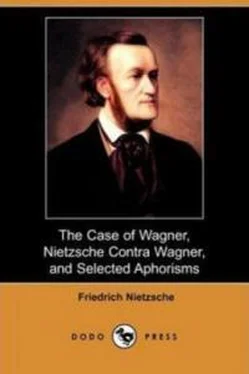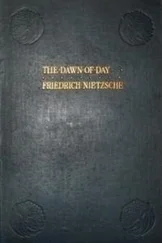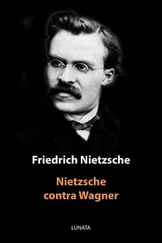6.
I was in love with art, passionately in love, and in the whole of existence saw nothing else than art—and this at an age when, reasonably enough, quite different passions usually possess the soul.
7.
Goethe said: "The yearning spirit within me, which in earlier years I may perhaps have fostered too earnestly, and which as I grew older I tried my utmost to combat, did not seem becoming in the man, and I therefore had to strive to attain to more complete freedom." Conclusion?—I have had to do the same.
8.
He who wakes us always wounds us.
9.
I do not possess the talent of being loyal, and what is still worse, I have not even the vanity to try to appear as if I did.
10.
He who accomplishes anything that lies beyond the vision and the experience of his acquaintances,—provokes envy and hatred masked as pity,—prejudice regards the work as decadence, disease, seduction. Long faces.
11.
I frankly confess that I had hoped that by means of art the Germans would become thoroughly disgusted with decaying Christianity —I regarded German mythology as a solvent, as a means of accustoming people to polytheism.
What a fright I had over the Catholic revival!!
12.
It is possible neither to suffer sufficiently acutely from life, nor to be so lifeless and emotionally weak, as to have need of Wagner's art, as to require it as a medium. This is the principal reason of one's opposition to it, and not baser motives; something to which we are not driven by any personal need, and which we do not require , we cannot esteem so highly.
13.
It is a question either of no longer requiring Wagner's art, or of still requiring it.
Gigantic forces lie concealed in it: it drives one beyond its own domain .
14.
Goethe said: "Are not Byron's audacity, sprightliness and grandeur all creative? We must beware of always looking for this quality in that which is perfectly pure and moral. All greatness is creative the moment we realise it." This should be applied to Wagner's art.
15.
We shall always have to credit Wagner with the fact that in the second half of the nineteenth century he impressed art upon our memory as an important and magnificent thing. True, he did this in his own fashion, and this was not the fashion of upright and far–seeing men.
16.
Wagner versus the cautious, the cold and the contented of the world—in this lies his greatness—he is a stranger to his age—he combats the frivolous and the super–smart—But he also fights the just, the moderate, those who delight in the world (like Goethe), and the mild, the people of charm, the scientific among men—this is the reverse of the medal.
17.
Our youth was up in arms against the soberness of the age. It plunged into the cult of excess, of passion, of ecstasy, and of the blackest and most austere conception of the world.
18.
Wagner pursues one form of madness, the age another form. Both carry on their chase at the same speed, each is as blind and as unjust as the other.
19.
It is very difficult to trace the course of Wagner's inner development—no trust must be placed in his own description of his soul's experiences. He writes party–pamphlets for his followers.
20.
It is extremely doubtful whether Wagner is able to bear witness about himself.
21.
There are men who try in vain to make a principle out of themselves . This was the case with Wagner.
22.
Wagner's obscurity concerning final aims; his non–antique fogginess.
23.
All Wagner's ideas straightway become manias; he is tyrannised over by them. How can such a man allow himself to be tyrannised over in this way ! For instance by his hatred of Jews. He kills his themes like his "ideas," by means of his violent love of repeating them. The problem of excessive length and breadth; he bores us with his raptures.
24.
" C'est la rage de voulour penser et sentir au delà de sa force " (Doudan). The Wagnerites.
25.
Wagner whose ambition far exceeds his natural gifts, has tried an incalculable number of times to achieve what lay beyond his powers—but it almost makes one shudder to see some one assail with such persistence that which defies conquest—the fate of his constitution.
26.
He is always thinking of the most extreme expression,—in every word. But in the end superlatives begin to pall.
27.
There is something which is in the highest degree suspicious in Wagner, and that is Wagner's suspicion. It is such a strong trait in him, that on two occasions I doubted whether he were a musician at all.
28.
The proposition: "in the face of perfection there is no salvation save love," [16] What Schiller said of Goethe.— Tr.
is thoroughly Wagnerian. Profound jealousy of everything great from which he can draw fresh ideas. Hatred of all that which he cannot approach, the Renaissance, French and Greek art in style.
29.
Wagner is jealous of all periods that have shown restraint : he despises beauty and grace, and finds only his own virtues in the "Germans," and even attributes all his failings to them.
30.
Wagner has not the power to unlock and liberate the soul of those he frequents. Wagner is not sure of himself, but distrustful and arrogant. His art has this effect upon artists, it is envious of all rivals.
31.
Plato's Envy. He would fain monopolise Socrates. He saturates the latter with himself, pretends to adorn him (καλὸς Σωκρᾴτης), and tries to separate all Socratists from him in order himself to appear as the only true apostle. But his historical presentation of him is false, even to a parlous degree: just as Wagner's presentation of Beethoven and Shakespeare is false.
32.
When a dramatist speaks about himself he plays a part: this is inevitable. When Wagner speaks about Bach and Beethoven he speaks like one for whom he would fain be taken. But he impresses only those who are already convinced, for his dissimulation and his genuine nature are far too violently at variance.
33.
Wagner struggles against the "frivolity" in his nature, which to him the ignoble (as opposed to Goethe) constituted the joy of life.
34.
Wagner has the mind of the ordinary man who prefers to trace things to one cause. The Jews do the same: one aim , therefore one Saviour. In this way he simplifies German and culture; wrongly but strongly.
35.
Wagner admitted all this to himself often enough when in private communion with his soul. I only wish he had also admitted it publicly. For what constitutes the greatness of a character if it is not this, that he who possesses it is able to take sides even against himself in favour of truth.
36.
That which is un–German in Wagner. He lacks the German charm and grace of a Beethoven, a Mozart, a Weber; he also lacks the flowing, cheerful fire ( Allegro con brio ) of Beethoven and Weber. He cannot be free and easy without being grotesque. He lacks modesty, indulges in big drums, and always tends to surcharge his effect. He is not the good official that Bach was. Neither has he that Goethean calm in regard to his rivals.
37.
Wagner always reaches the high–water mark of his vanity when he speaks of the German nature (incidentally it is also the height of his imprudence); for, if Frederick the Great's justice, Goethe's nobility and freedom from envy, Beethoven's sublime resignation, Bach's delicately transfigured spiritual life,—if steady work performed without any thought of glory and success, and without envy, constitute the true German qualities, would it not seem as if Wagner almost wished to prove he is no German?
Читать дальше











